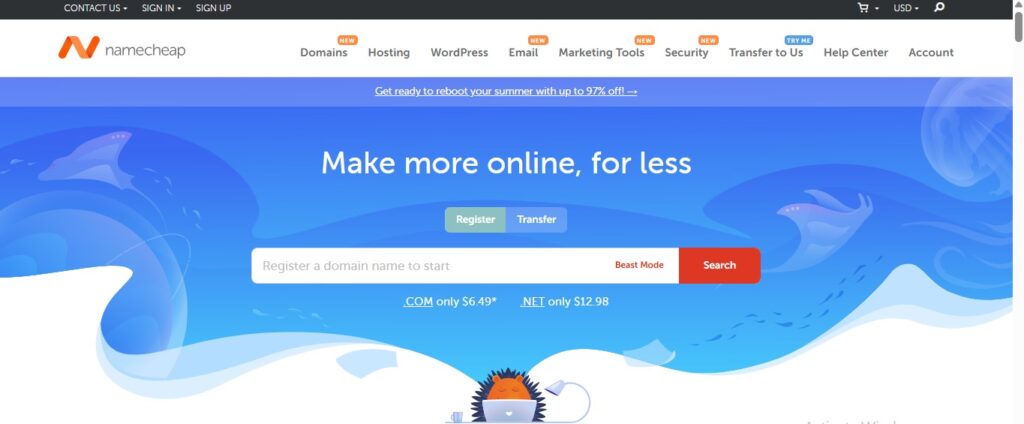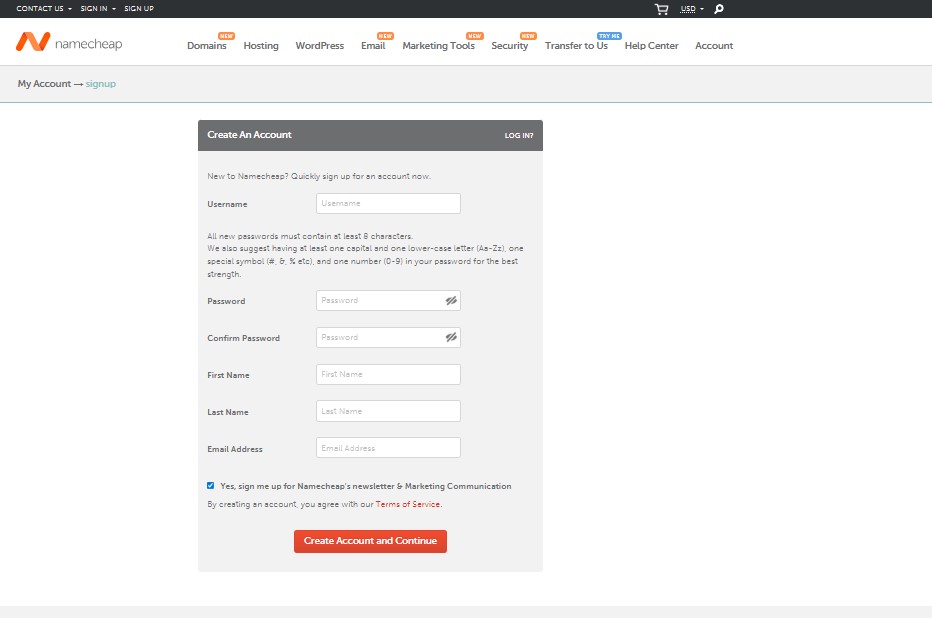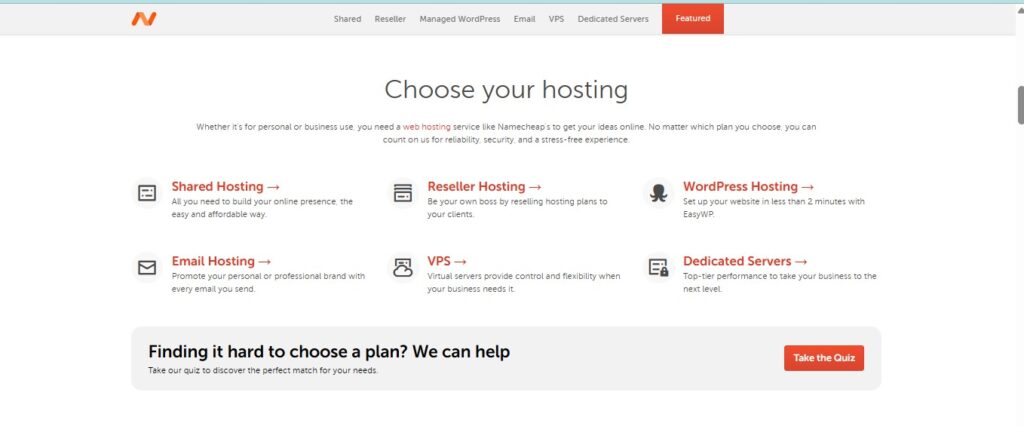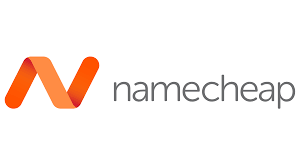Getting Started with Namecheap opens doors to a world of possibilities that many newcomers to the web hosting industry don’t fully appreciate until they’ve experienced the platform firsthand. This comprehensive guide will walk you through every aspect of beginning your journey with one of the industry’s most respected and customer-focused hosting providers.
Table of Contents
Your Complete Guide to Building a Successful Online Presence
Embarking on your digital journey requires making strategic decisions that will impact your online success for years to come. Getting Started with Namecheap represents one of the most intelligent choices you can make when establishing your web presence, whether you’re launching a personal blog, building a business website, or creating an e-commerce empire. In today’s competitive digital landscape, choosing the right hosting provider isn’t just about finding the cheapest option—it’s about discovering a partner that offers reliability, comprehensive features, and genuine value that grows with your ambitions.
From initial account creation through advanced optimization techniques, we’ll explore how Getting Started with Namecheap can transform your online aspirations into tangible digital success.
The beauty of Getting Started with Namecheap lies not just in their competitive pricing or feature-rich hosting packages, but in their commitment to making professional web services accessible to everyone, regardless of technical expertise or budget constraints. Throughout this detailed exploration, we’ll uncover the strategies, tools, and insider knowledge that will help you maximize your investment and build a thriving online presence that stands out in today’s crowded digital marketplace.
Understanding Namecheap: Your Gateway to Digital Success
Getting Started with Namecheap begins with understanding what sets this company apart from the countless hosting providers competing for your attention and investment. Founded with a mission to democratize access to professional web services, Namecheap has evolved from a simple domain registrar into a comprehensive digital solutions ecosystem that serves millions of customers worldwide.
The company’s philosophy centers around providing enterprise-level features at prices that don’t require enterprise-level budgets. This approach has made them particularly popular among entrepreneurs, small businesses, and creative professionals who need reliable hosting services but must maintain strict cost controls. Their service portfolio spans domain registration, various hosting solutions, email services, security implementations, website building tools, and specialized developer resources.
What truly distinguishes Namecheap in the hosting landscape is their commitment to transparency and customer advocacy. Unlike many competitors who employ complex pricing schemes with significant renewal increases, Namecheap maintains relatively predictable pricing structures that allow customers to budget effectively for long-term hosting expenses. This transparency extends to their service descriptions, billing practices, and customer communications.
Getting Started with Namecheap also means joining a community that values internet freedom, digital privacy, and fair business practices. The company has consistently advocated for policies that protect user privacy and promote open internet access, making them attractive to privacy-conscious users and businesses that prefer working with ethically-minded service providers.
Their target audience encompasses everyone from individual bloggers creating their first websites to established businesses expanding their digital footprint. This diversity has driven them to develop flexible service tiers and customization options that accommodate vastly different requirements, technical skill levels, and growth trajectories.
Creating Your Namecheap Account: First Steps to Success
Getting Started with Namecheap requires establishing your account through a straightforward registration process that prioritizes both simplicity and security. The initial signup procedure involves providing basic contact information, creating secure login credentials, and verifying your identity through email confirmation. This process has been streamlined to minimize friction while maintaining the security standards necessary to protect your digital assets.
During account creation, you’ll need to provide accurate contact information that will be used for billing notifications, service updates, and security communications. Namecheap takes data protection seriously, employing industry-standard encryption protocols to safeguard your personal information throughout the registration process and during your ongoing relationship with their services.
The email verification step serves dual purposes: confirming your identity and ensuring that you can receive important account notifications. Once verification is complete, you’ll gain access to Namecheap’s comprehensive account management dashboard, where you can monitor services, manage billing information, access support resources, and configure various security settings.
Security features during the signup process include password strength requirements and optional two-factor authentication (2FA) setup. Implementing 2FA during initial account creation provides an additional security layer that protects your account from unauthorized access attempts. This security enhancement is particularly important considering that your Namecheap account will likely control critical business assets including domain names, hosting services, and email systems.
Getting Started with Namecheap also involves familiarizing yourself with their account dashboard interface, which has been designed to accommodate both newcomers and experienced webmasters. The dashboard provides intuitive navigation alongside advanced management tools, ensuring that you can efficiently handle routine tasks while having access to sophisticated configuration options as your expertise grows.
For users migrating from other hosting providers, Namecheap offers specialized onboarding assistance that can help transfer existing services with minimal disruption. Their migration specialists provide guidance on transferring domains, websites, email accounts, and other digital assets, ensuring a smooth transition that maintains service continuity throughout the process.
Domain Registration: Securing Your Digital Identity
Getting Started with Namecheap typically begins with domain registration, as your domain name forms the foundation of your entire online identity. The domain selection process represents one of your most crucial branding decisions, affecting everything from search engine optimization to customer perception of your business credibility.
Namecheap’s domain search platform has been engineered to simplify the complex process of finding available domains while providing advanced tools for users who require sophisticated domain management capabilities. Their search algorithm explores availability across hundreds of top-level domain (TLD) extensions, including traditional options like .com and .org, as well as newer generic top-level domains (gTLDs) that can provide more specific branding opportunities.
When your preferred domain is unavailable, Namecheap’s intelligent suggestion system reveals creative alternatives that might better serve your branding objectives. These suggestions consider factors like keyword relevance, memorability, and branding potential, helping you discover options you might not have considered independently.
One of Namecheap’s most valuable features is their complimentary WHOIS privacy protection, which shields your personal information from public domain databases. This service, which many competitors charge additional fees for, protects you from spam, unwanted solicitations, and potential security threats while maintaining your domain ownership rights. This privacy protection reflects their broader commitment to user security and digital rights.
The domain management interface provides comprehensive tools for DNS configuration, subdomain creation, forwarding setup, and renewal management. These features enable both simple website hosting and complex application deployments, ensuring that your domain registration can accommodate your current needs and future growth plans.

Choosing Your Hosting Plan: Foundation for Growth
Getting Started with Namecheap hosting requires understanding their comprehensive range of hosting solutions, each designed to serve different use cases, technical requirements, and budget constraints. Their hosting portfolio spans from basic shared hosting perfect for personal blogs to powerful dedicated servers capable of handling enterprise-level applications and traffic loads.
Shared hosting represents the most popular starting point for newcomers, providing excellent value through resource sharing among multiple websites on the same server infrastructure. Namecheap’s shared hosting utilizes solid-state drive (SSD) storage technology, which significantly improves website loading speeds compared to traditional mechanical hard drives. Combined with LiteSpeed Web Server technology, these performance enhancements can dramatically improve user experience and search engine rankings.
Virtual Private Server (VPS) hosting offers an excellent middle ground between shared hosting limitations and dedicated server costs. VPS solutions provide guaranteed resources, root access capabilities, and scalable configurations that can adapt to changing requirements. This flexibility is particularly valuable for growing businesses that need predictable performance but want to avoid the substantial costs associated with dedicated hardware.
For businesses with demanding performance requirements, Namecheap’s dedicated server solutions provide complete hardware control and customization options. These servers feature high-performance processors, substantial RAM allocations, and enterprise-grade storage systems that can handle significant traffic volumes and resource-intensive applications.
WordPress hosting deserves special consideration, as Namecheap’s EasyWP managed WordPress platform has been specifically optimized for the world’s most popular content management system. These hosting environments include pre-installed WordPress software, automatic updates, specialized caching systems, and security enhancements designed specifically for WordPress websites.
The decision-making process for Getting Started with Namecheap hosting should consider factors like expected traffic volume, technical requirements, growth projections, and budget constraints. Their customer service team can provide guidance for selecting the most appropriate hosting solution based on your specific needs and future plans.
[Suggested Image 2: Insert a comparison chart showing different Namecheap hosting plans with features, pricing, and recommended use cases]
Setting Up Your First Website
Getting Started with Namecheap website creation offers multiple pathways depending on your technical expertise, time availability, and customization requirements. Their platform supports everything from simple drag-and-drop website builders to sophisticated custom development environments that accommodate complex applications and unique design requirements.
Namecheap’s free website builder provides an excellent starting point for users who want to create professional-looking websites without investing in expensive design services or learning complex coding languages. The platform includes numerous industry-specific templates that provide starting points for various business types, from restaurants and retail stores to professional services and creative portfolios.
The drag-and-drop interface enables users to customize their websites through intuitive visual editing that doesn’t require technical knowledge. This approach makes website creation accessible to users who might otherwise be intimidated by the complexity of traditional website development processes. The visual editing system provides immediate feedback, allowing users to see exactly how their changes will appear to website visitors.
For users who prefer more control over their website design and functionality, Namecheap’s hosting platform supports popular content management systems like WordPress, Joomla, and Drupal. These platforms offer extensive customization options through themes, plugins, and custom code modifications while maintaining user-friendly administrative interfaces.
E-commerce integration represents another crucial consideration when Getting Started with Namecheap website development. Their hosting platform supports popular e-commerce solutions including WooCommerce, OpenCart, and Magento, enabling businesses to establish online sales channels without requiring expensive custom development or complex third-party integrations.
Website optimization features included with Namecheap hosting help ensure that your new website performs well in search engines and provides excellent user experiences. These features include caching systems, content delivery network (CDN) integration, and performance monitoring tools that can significantly improve website loading speeds and search engine rankings.
Email Setup: Professional Communication Solutions
Getting Started with Namecheap email hosting establishes professional communication capabilities that significantly enhance your business credibility and branding consistency. Using generic email providers like Gmail or Yahoo with your business communications can undermine professional credibility and limit your branding opportunities, making professional email hosting an essential investment for serious businesses.
Namecheap’s Private Email hosting solution provides comprehensive email services that integrate seamlessly with your domain name and business branding. The platform includes substantial storage allocations that eliminate concerns about running out of email space, which can be particularly problematic for businesses that rely heavily on email communications and document sharing.
The setup process for professional email accounts has been streamlined to accommodate users with varying technical expertise levels. The process involves accessing your hosting control panel, creating email accounts with your custom domain, and configuring email clients or webmail access according to your workflow preferences.
Anti-spam and anti-virus protection come standard with Namecheap’s email hosting, providing essential security features that protect your business communications from malicious emails and security threats. These protections operate transparently, filtering dangerous content before it reaches your inbox while ensuring that legitimate business communications are delivered promptly.
Collaboration features include shared calendars, contact management, and task coordination tools that can improve team productivity and communication efficiency. These business-oriented features help Namecheap’s email hosting compete effectively with more expensive business email platforms while maintaining the affordability that characterizes their overall service approach.
Mobile device configuration enables access to your professional email from smartphones and tablets, ensuring that you can maintain communication continuity regardless of your location. The platform supports popular email protocols including IMAP and POP3, enabling integration with various email clients and mobile applications.

Security Implementation: Protecting Your Digital Assets
Getting Started with Namecheap security implementation protects your investment and ensures that your online presence remains safe from the constantly evolving landscape of cyber threats. Their comprehensive security offerings span multiple protection layers, from SSL certificates that encrypt data transmission to advanced monitoring systems that detect and respond to potential security incidents.
SSL certificate installation represents one of the most critical security steps for any website, as these certificates encrypt data transmitted between your website and visitors while providing the security indicators that browsers display to reassure visitors about your website’s legitimacy. Namecheap includes SSL certificates with most hosting packages, simplifying the implementation process and reducing additional costs.
The SSL certificate installation process through Namecheap’s control panel has been automated to minimize technical complexity while ensuring proper configuration. Once installed, SSL certificates provide protection for login forms, contact forms, e-commerce transactions, and other sensitive data exchanges that occur on your website.
Two-factor authentication (2FA) setup provides additional account security by requiring a second verification step beyond your password when accessing your Namecheap account. This security enhancement significantly reduces the risk of unauthorized access, even if your password becomes compromised through phishing attacks or data breaches affecting other services.
Domain privacy protection shields your personal contact information from public WHOIS databases, reducing exposure to spam, unwanted solicitations, and potential identity theft attempts. This protection is particularly important for individual entrepreneurs and small business owners whose personal information might otherwise be publicly accessible through domain registration records.
Advanced security monitoring capabilities track suspicious activities and automatically respond to potential threats before they can cause significant damage to your website or business operations. These proactive security measures demonstrate Namecheap’s commitment to protecting their customers’ digital assets and ensuring business continuity.
WordPress Optimization: Maximizing Performance
Getting Started with Namecheap WordPress hosting unlocks specialized performance and security enhancements designed specifically for the world’s most popular content management system. WordPress powers over 40% of all websites globally, creating demand for hosting solutions that address the unique requirements and challenges associated with WordPress deployments.
Namecheap’s EasyWP managed WordPress platform includes automatic WordPress core updates, plugin updates, and security patches that help maintain website security without requiring constant manual maintenance. This automated approach reduces the risk of security vulnerabilities while ensuring that websites continue benefiting from the latest WordPress features and performance improvements.
Performance optimization features include specialized caching systems that store frequently accessed content in fast-loading formats, reducing server load and improving website speed for visitors. These caching systems work transparently, requiring no technical configuration while providing substantial performance benefits for WordPress websites of all sizes.
Content Delivery Network (CDN) integration distributes your website content across multiple global server locations, ensuring that visitors receive website data from nearby servers rather than distant primary hosting locations. This distribution can dramatically improve loading speeds for international visitors while reducing bandwidth usage on your primary hosting server.
Database optimization tools help maintain WordPress database efficiency as your website grows and accumulates content, comments, and user data. Regular database optimization prevents performance degradation that commonly affects WordPress websites over time, maintaining fast loading speeds even as content volume increases.
One-click backup and restoration capabilities provide essential protection for WordPress websites, creating regular snapshots of website content and database information. These automated backups enable quick recovery in case of technical problems, security incidents, or accidental content deletion, providing peace of mind for website owners who cannot afford extended downtime.
Advanced Configuration: Unlocking Full Potential
Getting Started with Namecheap advanced configuration options enables experienced users to customize their hosting environment for optimal performance and functionality. These advanced features provide the flexibility necessary to accommodate sophisticated applications, custom development projects, and unique business requirements that standard hosting configurations might not support.
DNS management tools provide granular control over domain routing and subdomain configuration, enabling advanced users to implement sophisticated traffic routing strategies and custom application deployments. These tools support various record types and configuration options that accommodate complex business requirements and technical implementations.
Database management capabilities include support for MySQL, PostgreSQL, and other database systems commonly used in web development. Advanced database features like remote access and replication support accommodate sophisticated application architectures and development workflows that require direct database connectivity.
SSH access enables command-line management and custom software installation that many developers require for sophisticated applications or deployment automation. This access level provides complete control over the server environment while maintaining the security and reliability of managed hosting services.
Git integration streamlines code deployment and version control workflows, allowing developers to maintain their preferred development practices while taking advantage of Namecheap’s hosting infrastructure. This integration supports modern development methodologies including continuous integration and automated deployment processes.
Cron job configuration enables automated task scheduling for maintenance routines, data processing, and other recurring operations that improve website functionality and reduce manual administrative overhead. These automation capabilities are particularly valuable for businesses that operate data-driven websites or require regular content updates.
E-commerce Setup: Building Your Online Store
Getting Started with Namecheap e-commerce development provides comprehensive support for businesses ready to establish online sales channels and tap into the growing digital marketplace. Their hosting infrastructure has been optimized to handle the unique requirements of e-commerce websites, including secure payment processing, inventory management, and high-traffic sales events.
E-commerce platform installation support includes popular solutions like WooCommerce, OpenCart, Magento, and other shopping cart systems that enable businesses to sell products and services online effectively. These platforms provide comprehensive features for product catalog management, customer account systems, order processing, and sales reporting.
SSL certificate provision is particularly crucial for e-commerce websites, as secure connections are essential for protecting customer payment information and building trust with potential buyers. Namecheap’s included SSL certificates provide the necessary encryption and security indicators that customers expect when making online purchases, while also providing search engine optimization benefits.
Payment processing integration support helps e-commerce businesses connect with popular payment processors and merchant account providers, enabling them to accept credit card payments, digital wallet transactions, and other payment methods that customers prefer. This integration support reduces the technical complexity associated with setting up online payment acceptance.
Database performance optimization features help ensure that product catalogs, customer accounts, and transaction records are processed efficiently, even during high-traffic periods like seasonal sales events or promotional campaigns. These optimizations can prevent website slowdowns that might cause customers to abandon their purchases and seek alternatives.
Scalability planning becomes particularly important for e-commerce websites that might experience rapid growth or seasonal traffic variations. Namecheap’s hosting platform provides upgrade paths from shared hosting through dedicated servers, ensuring that growing businesses can accommodate increased traffic without requiring complex website migrations.

Performance Monitoring: Maintaining Peak Efficiency
Getting Started with Namecheap performance monitoring establishes systems for tracking website speed, uptime, and user experience metrics that directly impact your business success. Regular performance monitoring helps identify potential issues before they affect visitors while providing insights for continuous optimization and improvement.
Website speed testing tools help measure loading times from various geographic locations and device types, providing comprehensive insights into how your website performs for different user segments. These measurements are crucial for identifying performance bottlenecks and prioritizing optimization efforts that will have the greatest impact on user experience.
Uptime monitoring services track website availability and alert you to potential service disruptions that might affect customer access to your website. Prompt notification of downtime events enables quick response to technical issues while providing documentation for service level agreement compliance and hosting provider accountability.
Traffic analysis tools provide detailed insights into visitor behavior, popular content, referral sources, and conversion patterns that inform business decisions and marketing strategies. Understanding these metrics helps optimize website content and structure for improved user engagement and business results.
Resource usage monitoring tracks server resource consumption including CPU usage, memory allocation, and bandwidth utilization. This monitoring helps identify when hosting upgrades might be necessary while providing insights into website optimization opportunities that can improve efficiency and reduce costs.
Error log analysis helps identify technical issues, broken links, and other problems that might affect website functionality or search engine rankings. Regular log review enables proactive problem resolution that maintains website quality and prevents minor issues from developing into significant problems.
Support Resources: Maximizing Your Success
Getting Started with Namecheap support utilization ensures that you can access assistance whenever technical challenges or questions arise during your hosting journey. Their comprehensive support infrastructure has been designed to provide multiple assistance channels while maintaining response quality across all interaction methods.
Live chat support provides immediate access to knowledgeable support representatives who can address technical questions, billing inquiries, and account management issues in real-time. The chat system includes screen sharing capabilities that allow support representatives to provide visual guidance for complex configuration tasks or troubleshooting procedures.
Ticket-based support offers a structured approach for complex technical issues that might require detailed investigation or multiple interaction rounds to resolve completely. This system maintains comprehensive records of support interactions, ensuring continuity when issues require escalation or follow-up assistance from different support team members.
Knowledge base resources represent one of the most comprehensive self-service support systems in the hosting industry, including detailed tutorials, troubleshooting guides, and best practice recommendations for virtually every aspect of Namecheap’s service offerings. These resources are regularly updated to reflect platform changes and emerging best practices.
Community forums provide additional support opportunities through peer-to-peer assistance and knowledge sharing. These forums are actively moderated by Namecheap staff members who provide authoritative answers to complex questions while encouraging community participation and knowledge sharing among users with similar challenges.
Video tutorials and webinars address common website management tasks and advanced optimization techniques, providing visual learning resources that complement written documentation. These educational materials are particularly valuable for users who prefer visual learning methods or need to understand complex procedures.
Migration Assistance: Seamless Transitions
Getting Started with Namecheap migration services eliminate the complexity and risk traditionally associated with transferring websites, databases, and email systems from other hosting providers. Their specialized migration team handles the technical details while minimizing downtime and reducing the risk of data loss during the transition process.
Pre-migration planning includes comprehensive analysis of existing websites and hosting configurations to identify potential compatibility issues and develop strategies for addressing them before they can affect website functionality. This planning phase helps ensure that websites continue operating normally throughout the transition period and immediately after migration completion.
Domain transfer procedures have been streamlined to minimize complexity while ensuring that security and ownership verification requirements are met properly. Namecheap’s domain specialists guide customers through authorization processes and help coordinate timing to ensure that websites and email services continue operating during domain transfers.
Website file and database migration involves transferring all website content, configuration files, and database information to Namecheap’s hosting infrastructure while maintaining file structure and functionality. This process includes testing procedures that verify migrated websites function correctly before switching DNS routing to Namecheap’s servers.
Email account migration receives special attention due to the business-critical nature of email communications. Namecheap’s migration team can transfer existing email accounts, folder structures, and message archives while ensuring that ongoing email delivery continues without interruption during the transition process.
Post-migration support continues after the transfer is complete, providing assistance with any configuration adjustments or optimization tasks that might be necessary to ensure optimal performance in the new hosting environment.
Scaling Your Success: Growth Strategies
Getting Started with Namecheap growth planning establishes foundations for scaling your online presence as your business expands and evolves. Understanding available upgrade paths and optimization strategies helps ensure that your hosting infrastructure can support business growth without requiring disruptive migrations or service interruptions.
Traffic growth planning involves monitoring website performance metrics and resource utilization to predict when hosting upgrades might be necessary. Proactive planning enables smooth transitions to more powerful hosting solutions before performance issues affect user experience or business operations.
Resource scaling options include straightforward upgrade paths from shared hosting to VPS solutions, and from VPS to dedicated servers as requirements grow. These upgrade options provide guaranteed resource allocations and improved performance capabilities without requiring complex website migrations or extended downtime.
Content delivery optimization becomes increasingly important as websites grow and serve visitors from diverse geographic locations. CDN implementation and advanced caching strategies can dramatically improve website performance while reducing server load and bandwidth consumption.
Security enhancement strategies include implementing advanced monitoring systems, backup procedures, and access controls that protect growing businesses from increasingly sophisticated cyber threats. These security measures become more critical as businesses handle larger volumes of customer data and financial transactions.
Marketing integration opportunities include connecting websites with email marketing platforms, social media management tools, and analytics systems that support comprehensive digital marketing strategies. These integrations help maximize the return on investment in website development and hosting services.
Frequently Asked Questions
How do I create my first Namecheap account? Getting Started with Namecheap account creation involves visiting their website, clicking the signup button, and providing basic contact information including your name, email address, and secure password. Email verification is required to activate your account and access the management dashboard. Learn more about account creation at https://www.namecheap.com/support/knowledgebase/article.aspx/375/5/how-to-create-a-namecheap-account.
What hosting plan should I choose as a beginner? For beginners, Getting Started with Namecheap shared hosting typically provides the best value and includes all necessary features for personal websites and small businesses. Their Stellar plan offers excellent performance with SSD storage, free SSL certificates, and unmetered bandwidth. Compare hosting options at https://www.namecheap.com/hosting/shared/.
How long does it take to set up a website with Namecheap? Getting Started with Namecheap website setup can be completed within hours using their website builder or WordPress installation tools. Domain propagation typically takes 24-48 hours, but you can begin building your website immediately after purchasing hosting services. Get setup guidance at https://www.namecheap.com/support/knowledgebase/article.aspx/9645/2208/how-to-create-a-website.
Is Namecheap suitable for WordPress websites? Getting Started with Namecheap WordPress hosting through their EasyWP platform provides optimized performance, automatic updates, and WordPress-specific security features. Their regular shared hosting also supports WordPress with one-click installation and excellent compatibility. Explore WordPress options at https://www.namecheap.com/wordpress/.
What security features are included with Namecheap hosting? Getting Started with Namecheap security includes free SSL certificates, automated backups, DDoS protection, and access to additional security services like VPN and premium monitoring. Two-factor authentication is available for account protection. Review security features at https://www.namecheap.com/security/.
Can I migrate my existing website to Namecheap? Getting Started with Namecheap migration is supported through their free website migration service, which handles the technical aspects of transferring websites, databases, and email accounts from other providers. Their specialists work to minimize downtime during the transition process. Request migration assistance at https://www.namecheap.com/support/knowledgebase/article.aspx/9175/5/website-migration-service.
How much does it cost to get started with Namecheap? Getting Started with Namecheap costs vary depending on your needs, but shared hosting plans start under $3/month, domains typically cost $8-15/year, and many features like SSL certificates and basic security are included at no extra charge. View current pricing at https://www.namecheap.com/pricing/.
Conclusion: Your Journey Begins Here
Getting Started with Namecheap represents more than simply choosing a hosting provider—it’s about partnering with a company that prioritizes your success, protects your investment, and provides the tools necessary to build a thriving online presence. Throughout this comprehensive guide, we’ve explored every aspect of beginning your digital journey with one of the industry’s most respected and customer-focused hosting companies.
The evidence overwhelmingly supports Namecheap as an excellent choice for individuals and businesses seeking reliable, affordable, and feature-rich web hosting services. Their combination of competitive pricing, comprehensive features, strong customer support, and commitment to customer success creates an environment where online businesses can flourish without the budget constraints that often limit growth and innovation.
Getting Started with Namecheap provides access to professional-grade hosting infrastructure, advanced security features, and optimization tools that were once available only to large corporations with substantial technology budgets. Their democratization of these services enables entrepreneurs, small businesses, and creative professionals to compete effectively in the digital marketplace while maintaining the financial flexibility necessary for sustainable growth.
The company’s commitment to transparency, ethical business practices, and customer advocacy creates a hosting environment that prioritizes long-term relationships over short-term profits. This philosophy translates into stable pricing, comprehensive included features, and support quality that exceeds what you might expect at these price points.
Your online success story begins with making smart, strategic decisions about your digital infrastructure. Getting Started with Namecheap represents one of the most intelligent choices you can make for establishing a strong foundation for your online presence. Their comprehensive service offerings, competitive pricing, and commitment to customer success provide everything necessary to transform your digital aspirations into measurable business results.
Take the first step toward your online success today. Visit Namecheap’s website, explore their hosting options, and discover how Getting Started with Namecheap can accelerate your journey toward digital success. Your future customers are waiting to discover what you have to offer—Namecheap provides the platform to reach them effectively and efficiently.




